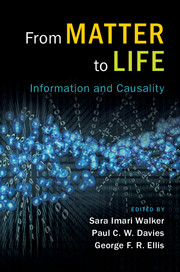Book contents
- Frontmatter
- Contents
- About the authors
- 1 Introduction
- Part I Physics and Life
- 2 The “Hard Problem” of Life
- 3 Beyond Initial Conditions and Laws of Motion: Constructor Theory of Information and Life
- Part II Bio from Bit
- Part III Life's Hidden Information
- Part IV Complexity and Causality
- Part V From Matter to Mind
- Index
2 - The “Hard Problem” of Life
from Part I - Physics and Life
Published online by Cambridge University Press: 02 March 2017
- Frontmatter
- Contents
- About the authors
- 1 Introduction
- Part I Physics and Life
- 2 The “Hard Problem” of Life
- 3 Beyond Initial Conditions and Laws of Motion: Constructor Theory of Information and Life
- Part II Bio from Bit
- Part III Life's Hidden Information
- Part IV Complexity and Causality
- Part V From Matter to Mind
- Index
Summary
There are few open problems in science as perplexing as the nature of life and consciousness. At present, we do not have many scientific windows into either. In the case of consciousness, it seems evident that certain aspects will ultimately defy reductionist explanation, the most important being the phenomenon of qualia – roughly speaking, our subjective experience as observers. It is a priori far from obvious why we should have experiences such as the sensation of the smell of coffee or the blueness of the sky. Subjective experience isn't necessary for the evolution of intelligence (we could, for example, be zombies in the philosophical sense and appear to function just as well from the outside with nothing going on inside). Even if we do succeed in eventually uncovering a complete mechanistic understanding of the wiring and firing of every neuron in the brain, it might tell us nothing about thoughts, feelings, and what it is like to experience something. Our phenomenal experiences are the only aspect of consciousness that appears as though they cannot, even in principle, be reduced to known physical principles. This led Chalmers to identify pinpointing an explanation for our subjective experience as the “hard problem of consciousness.” The corresponding “easy problems” (in practice not so easy) are associated with mapping the neural correlates of various experiences. By focusing attention on the problem of subjective experience, Chalmers highlighted the truly inexplicable aspect of consciousness, based on our current understanding. The issue, however, is by no means confined to philosophy. Chalmers’ proposed resolution is to regard subjective consciousness as an irreducible, fundamental property of mind, with its own laws and principles. Progress can be expected to be made by focusing on what would be required for a theory of consciousness to stand alongside our theories for matter, even if it turns out that something fundamentally new is not necessary.
The same may be true for life. With the case of life, it seems as though we have a better chance of understanding it as a physical phenomenon than we do with consciousness.
- Type
- Chapter
- Information
- From Matter to LifeInformation and Causality, pp. 19 - 37Publisher: Cambridge University PressPrint publication year: 2017
- 8
- Cited by



